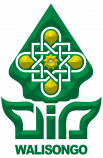UIN Walisongo Semarang - Indonesia
Dawr Tajribat "Bandongan†al-Ta‘līmīyah fī al-Qudrah ‘alá Tarjamat al-Mubtada’ wa-al-Khabar min Wajhat Naẓar Ṭalabat Qism Ta‘līm al-Lughah al-‘Arabīyah
The learning method for the Yellow Book in Islamic boarding schools uses the Arabic translation of Pegon to make its meaning. Pegon Arabic translation is one of the local wisdoms and traditions of studying medieval Islamic texts in the education system implemented by traditional Islamic boarding schools in Java which is still used today. This research takes the form of field research with research methods in the form of qualitative methods, namely data collection techniques by filling out questionnaires and tests. What defines Bandongan is a learning activity that has an approach that prioritizes collective service (collective approach). Mubtada linguistically means starting, so in nahwu science terms mubtada is the term at the beginning of a sentence in the form of ma'rifah. Meanwhile, Khobar is the isim read by Rofa, side by side with mubtada. So the definition of Mubtada Khobar is two isim which form the composition of the number of ismiyyah (perfect sentences). Based on the results of data collection using a questionnaire conducted on 26 students in the PBA 3B class, researchers found that almost 100% of the PBA 3B Class of 2022 students had studied the book. From the test results, it can be seen that almost 80% of students who have studied using the bandongan method have the ability to translate well based on the data presented above, so the author concludes that reciting the Koran using the bandongan method is more common than the sorogan method. In bandongan method activities, students do not need to demonstrate their ability to read or translate the yellow book. And in this activity students only pay attention, write, listen and listen to kiai when translating a book into Javanese. Bandongan has been used for a long time by some Indonesian people in Islamic boarding schools, especially in Central Java and East Java.
Keywords: Arabic education students; Arabic grammar; bandongan learning experience; mubtada and khabar; translation skills
- Afifullah, A. (2021). EKSISTENSI METODE BANDONGAN DALAM PEMBELAJARAN TAFSIR PADA PESANTREN DI ERA KONTEMPORER. REVELATIA: Jurnal Ilmu al-Qur`an Dan Tafsir, 2(2), 162–180. https://doi.org/10.19105/revelatia.v2i2.5087
- Anis, M. Y., & Saddhono, K. (n.d.). STRATEGI PENERJEMAHAN ARAB-JAWA SEBAGAI SEBUAH UPAYA DALAM MENJAGA KEARIFAN BAHASA LOKAL (INDIGENOUS LANGUAGE): STUDI KASUS DALAM PENERJEMAHAN KITAB BIDAYATUL-HIDAYAH KARYA IMAM AL-GHAZALI.
- Chairi, E. (2019). Pengembangan Metode Bandongan dalam Kajian Kitab Kuning di Pesantren Attarbiyah Guluk-Guluk dalam Perspektif Muhammad Abid al-Jabiri. Nidhomul Haq : Jurnal Manajemen Pendidikan Islam, 4(1), 70–89. https://doi.org/10.31538/ndh.v4i1.233
- Damayulfi, A. C., Firdaus, M., & Adam Ibrahim, F. M. (2023). The Influence of Javanese-Arabic Translation Methods by Tafsir Al-Jalalain towards the Students’ Mastery in Nahwu. Jurnal Al Bayan: Jurnal Jurusan Pendidikan Bahasa Arab, 15(1), 118–132. https://doi.org/10.24042/albayan.v15i1.13068
- Elmubarok, Z., Qutni, D., Bahasa Asing, J., Bahasa dan Seni, F., & Negeri Semarang, U. (2020). Journal of Arabic Learning and Teaching BAHASA ARAB PEGON SEBAGAI TRADISI PEMAHAMAN AGAMA ISLAM DI PESISIR JAWA Abstrak. http://journal.unnes.ac.id/sju/index.php/laa
- Fatchan, A., Amirudin, A., & Soekamto, H. (2015). Education model “bandongan†for farmers society of agricultural skills training in the background of sosioculture “pesantren†in East Java. Mediterranean Journal of Social Sciences, 6(5), 515–523. https://doi.org/10.5901/mjss.2015.v6n5p515
- Hidayah. (2019). PENINGKATAN KEMAMPUAN MEMBACA KITAB KUNING MELALUI PEMBELAJARAN ARAB PEGON. Jurnal Ilmu Pendidikan, 3.
- Ilmu Budaya, F., Gadjah Mada SASDAYA, U., & Masrukhi, M. (2017). Unit Penelitian dan Penerbitan Penerjemahan Arab-Jawa Tradisi Pesantren Pada Karya Kitab-Kitab Klasik: Analisis Fungsi  Arabic-Javanese Translations on Classical Books in Pesantren Tradition: Function Analysis. Gadjah Mada Journal of Humanities, 2(1), 283–301.
- Kamal. (2020). MODEL PEMBELAJARAN SOROGAN DAN BANDONGAN DALAM TRADISI PONDOK PESANTREN. Jurnal Paramurobi, 3.
- Khofifah, N., & Prianto, M. H. (n.d.). Januari 2022| Hal 51-60 Nurul Khofifah, Muhammad Heri Prianto. In Jurnal Pendidikan Agama Islam Miazhar | p-ISSN (Vol. 1, Issue 2).
- Khoironi, A. Shohib. 2008. Audhohul Manahij. Jatibening: WCM Press.
- Mawaddah, S. L. (2022a). Problematika Pembelajaran Nahwu Menggunakan Metode Klasik Arab Pegon di Era Modern. Maharaat: Jurnal Pendidikan Bahasa Arab, 4(2), 102–119. https://doi.org/10.18196/mht.v4i2.12976
- Muntaha, H. (2021). BENTUK FI’IL, FA’IL DAN MUBTADA’ KHABAR DALAM QASHIDAH AL-BURDAH BAIT 1 SAMPAI 58. El Wahdah, 2.
- Nurhayati, T., & Rudi, A. (2023). PERDEBATAN MADZHAB BASHRAH DAN KUFAH DALAM PENETAPAN KAIDAH-KAIDAH NAHWU. In JILBAP (Vol. 01, Issue 01).
- Ridlowi, A. (n.d.). IMPLEMENTASI DAN PROBLEMATIKA PEMBELAJARAN KITAB KUNING DENGAN ARAB PEGON ( Studi di Ponpes Al-Falah Karangrejo Pacitan ).
- Rinaningsih, Kadarohman, A., Firman, H., & Sutoyo, S. (2018). Profile of students’ learning styles in Sorogan-Bandongan organic chemistry lecture. Journal of Physics: Conference Series, 1013(1). https://doi.org/10.1088/1742-6596/1013/1/012093
- Rohmah, A., & Muklas, M. (2018). Aplikasi Metode Penerjemahan dalam Pembelajaran Kitab Kuning. Titian Ilmu: Jurnal Ilmiah Multi Sciences, 10(2), 92–98. https://doi.org/10.30599/jti.v10i2.324
- Sa’adah, N. (2019). Problematika Pembelajaran Nahwu bagi Tingkat Pemula Menggunakan Arab Pegon. Lisanan Arabiya, 3(1). https://doi.org/10.32699/liar.v3i01.987
- Shefia Mumtaz, N., Zahroh, T., Firda, Z., & Afifah, N. (n.d.). Seminar Nasional Bahasa Arab Mahasiswa V Tahun 2021 HMJ Sastra Arab Fakultas Sastra Universitas Negeri Malang.
- Sirad, M. C., Rusyadi, R., & Choiruddin, C. (2023). The Implementation of the Utawi Iki-Iku (Pegon Symbols) Formula Method in Basic Syntax Courses at Islamic Higher Education. Arabiyatuna: Jurnal Bahasa Arab, 7(1 May), 299. https://doi.org/10.29240/jba.v7i1.6465
- Zakaria, Aceng. 2007. Muyassar fii Ilmi an-Nahwi. sukabumi: Ibn Azka Press.
 Copyright (c) 2024 Alsina : Journal of Arabic Studies
Copyright (c) 2024 Alsina : Journal of Arabic Studies

This work is licensed under a Creative Commons Attribution-NonCommercial-ShareAlike 4.0 International License.


